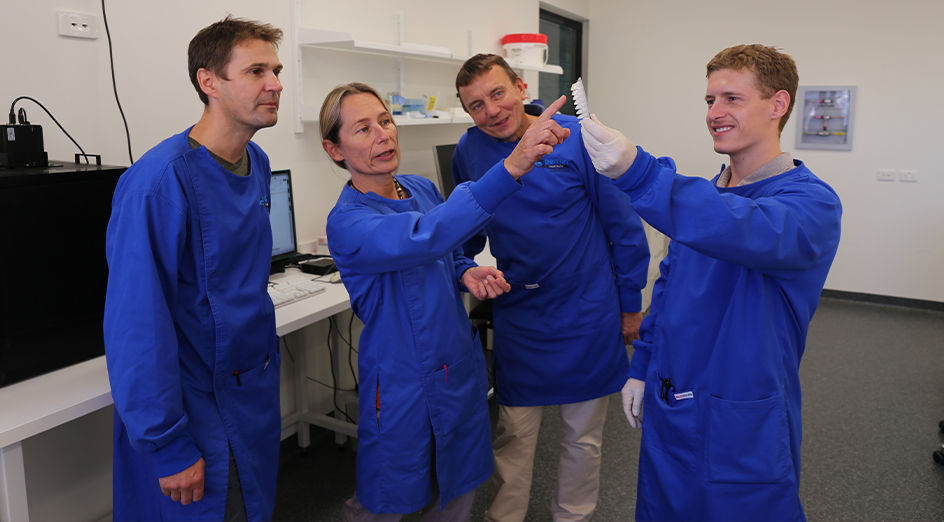A pilot project has validated the feasibility of a rapid, highly sensitive population screening platform for detecting viruses such as those causing COVID-19.
The technology makes repeated testing quicker and easier without compromising quality.
The Avicena Sentinel saliva sampling approach involves sensitive molecular processes and ultra-high throughput technology for screening potentially infectious, asymptomatic carriers.
It can run up to four thousand samples per hour, with results reported within 25 minutes.
Latest data published in the Nature journal Scientific Reports shows 98 per cent accuracy in identifying the SARS-CoV-2 virus in samples.
 Image: Robert Dewhurst, Tatjana Heinrich, Sulev Koks and Jack Rudrum in a Perron Institute lab. Credit: Perron Institute
Image: Robert Dewhurst, Tatjana Heinrich, Sulev Koks and Jack Rudrum in a Perron Institute lab. Credit: Perron Institute
Senior author, Professor Sulev Koks, Head of Genetic Epidemiology Research at Western Australia’s Perron Institute and Murdoch University, is among the scientists and others contributing.
He is collaborating with local specialists from Avicena Systems, Telethon Kids Institute and The University Western Australia and further afield in the United Kingdom and Spain. The key overseas organisations evaluating the technology are the Lancs LAMP Laboratory in Preston, UK and Biodonostia Health Research Institute in San Sebastian, Spain.
“While the diagnostic gold standard RT-PCR test accurately detects viruses such as SARS-CoV-2, which causes COVID-19, it lacks sufficient speed for efficient, large-scale routine surveillance screening and quarantine applications,” Professor Koks said.
“PCR results take hours and throughput is, at most, a few thousand samples processed per instrument per day. Also, nasopharyngeal PCR sampling requires trained personnel and has decreased participant acceptance if multiple testings are required within a short period.
“The rapid antigen tests (RAT) are easier to use but not sufficiently sensitive in detecting the virus in infected people who are contagious but have no symptoms. The viral load samples from presymptomatic or asymptomatic people can take several days to reach sufficient levels for detecting infection.
“Effective viral surveillance to contain outbreaks requires frequent testing with more sensitive assays, particularly as new variants arise.
“The proposed large-scale and convenient saliva testing platform combines accuracy and scalability to mitigate the risk of viral transmission as restrictions are lifted and to guard against future threats.
“It would make frequent testing feasible in complementing vaccines to contain the spread of highly infectious pandemic agents such as COVID-19.”
Further validation of Avicena’s rapid, ultra-sensitive Sentinel screening system is continuing.
First authors of the recent publication are Robert Dewhurst and Tatjana Heinrich (Perron Institute and Avicena Systems), and the other authors are Paul Watt and Paul Ostergaard (Avicena Systems), Jose Maria Marimon (Biodonostia Institute), Mariana Moreira and Philip Houldsworth (Lancs LAMP Laboratory), Jack Rudrum (Perron Institute) and David Wood (UWA).
The pilot Avicena Sentinel system was supported by grants from the WA Department of Health, Department of Premier and Cabinet, Department of Jobs, Tourism, Science and Industry, and a Modern Manufacturing Initiative grant from the Australian Government Department of Industry, Science, Energy and Resources.






